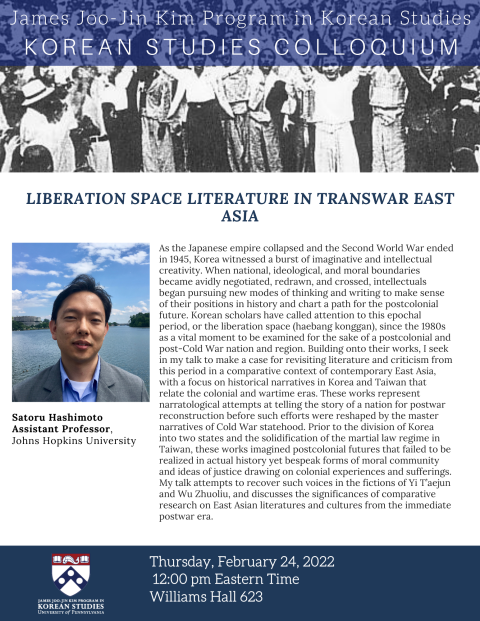
Korean Studies Colloquium
Williams Hall 623
As the Japanese empire collapsed and the Second World War ended in 1945, Korea witnessed a burst of imaginative and intellectual creativity. When national, ideological, and moral boundaries became avidly negotiated, redrawn, and crossed, intellectuals began pursuing new modes of thinking and writing to make sense of their positions in history and chart a path for the postcolonial future. Korean scholars have called attention to this epochal period, or the liberation space (haebang konggan), since the 1980s as a vital moment to be examined for the sake of a postcolonial and post-Cold War nation and region. Building onto their works, I seek in my talk to make a case for revisiting literature and criticism from this period in a comparative context of contemporary East Asia, with a focus on historical narratives in Korea and Taiwan that relate the colonial and wartime eras. These works represent narratological attempts at telling the story of a nation for postwar reconstruction before such efforts were reshaped by the master narratives of Cold War statehood. Prior to the division of Korea into two states and the solidification of the martial law regime in Taiwan, these works imagined postcolonial futures that failed to be realized in actual history yet bespeak forms of moral community and ideas of justice drawing on colonial experiences and sufferings. My talk attempts to recover such voices in the fictions of Yi T’aejun and Wu Zhuoliu, and discusses the significances of comparative research on East Asian literatures and cultures from the immediate postwar era.
Satoru Hashimoto is Assistant Professor in the Department of Comparative Thought and Literature at Johns Hopkins University. His research explores interplays between East Asian and European literatures and intellectual histories at the intersections of aesthetics, ethics, and politics. His first monograph, Afterlives of Letters: The Transnational Origins of Modern Chinese, Japanese, and Korean Literatures, examines how modern literature in China, Japan, and Korea was produced in the contexts of these nations’ interrelated literary traditions. He is working on his second book on the transcultural history of postwar East Asia from 1945 to 1953.
 James Joo-Jin Kim Center for Korean Studies
James Joo-Jin Kim Center for Korean Studies